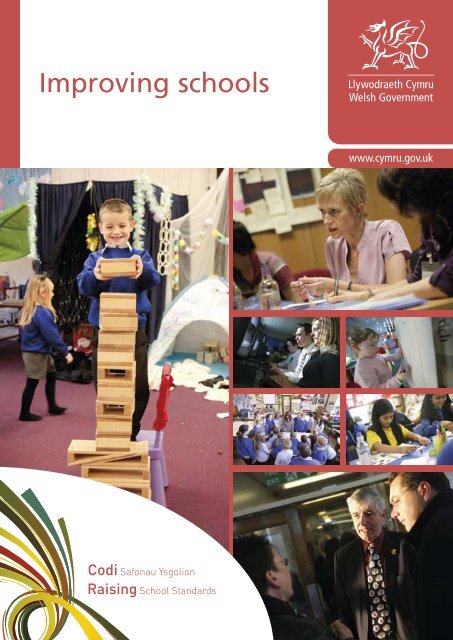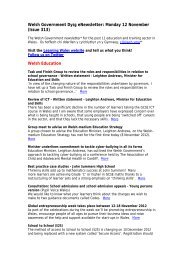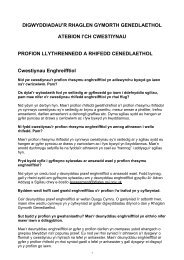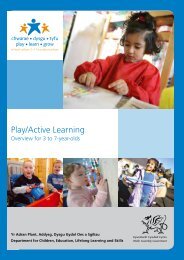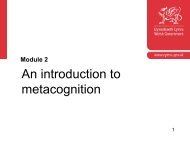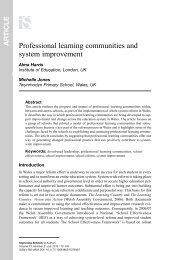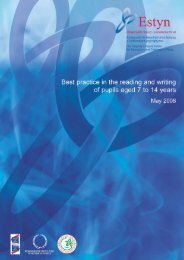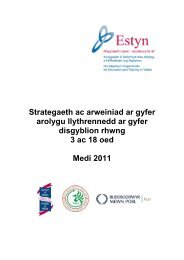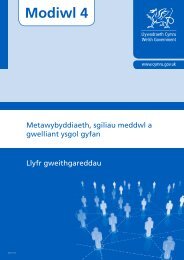Improving schools: full plan - Learning Wales - Welsh Government
Improving schools: full plan - Learning Wales - Welsh Government
Improving schools: full plan - Learning Wales - Welsh Government
You also want an ePaper? Increase the reach of your titles
YUMPU automatically turns print PDFs into web optimized ePapers that Google loves.
<strong>Improving</strong> <strong>schools</strong>
<strong>Improving</strong> <strong>schools</strong>AudienceThis document is aimed at leaders throughout the education systemwithin <strong>Wales</strong>, from <strong>schools</strong>, governing bodies and school staff unionsto local authorities, diocesan authorities and regional consortia,through to government and national partners.OverviewThe document is focused on the <strong>schools</strong> element of the educationsystem. It sets out <strong>plan</strong>s for improving the education system in <strong>Wales</strong>incorporating commitments made within the ‘Teaching makes adifference’ speech presented by the Minister for Education and Skillsin February 2011 and the Schools Effectiveness Framework. The <strong>plan</strong>identifies the roles of all partners in the process of reform.ActionrequiredNone – for information only.FurtherinformationEnquiries about this document should be directed to:School Standards and Delivery UnitDepartment for Education and Skills<strong>Welsh</strong> <strong>Government</strong>Cathays ParkCardiffCF10 3NQTel: 029 2080 1331e-mail: Teachingenquiries@wales.gsi.gov.ukAdditionalcopiesThis document can be accessed from the <strong>Welsh</strong> <strong>Government</strong>’swebsite at www.wales.gov.uk/educationandskillsDigital ISBN 978 0 7504 8003 1© Crown copyright 2012WG16534
ContentsMinisterial foreword 2Introduction 4Summary 111. Schools – effective learning and teaching in <strong>schools</strong> 152. Schools – effective leadership at all levels in <strong>schools</strong> 253. Building effective partnerships around <strong>schools</strong> 304. Implementation – roles, responsibilities and resources 37
Ministerial forewordA good education is critical to better life chances and acommitment to achieving this has been an important part ofthe culture of modern <strong>Wales</strong> since devolution. Progress hasbeen made in improving examination results at GCSE and Alevel and ensuring fewer young people leave school without aqualification, but there is still more to do to create an educationsystem that is at least good for all learners. The Programmefor International Student Assessment (PISA) in 2009 was awake-up call to an education system in <strong>Wales</strong> that had becomecomplacent, falling short of being consistently good and notdelivering the outcomes our learners deserved. GCSE results hadnot kept up with other parts of the UK and Estyn inspectionsrevealed standards were not as good as they should be in nearlya third of maintained <strong>schools</strong>. It was time to face up to theharsh truth: the education system in <strong>Wales</strong> needed reforming.My speech ‘Teaching makes a difference’ on 2 February 2011 setout these reforms. I stated that by 2015 I wanted <strong>Wales</strong> to be among the 20 top performingcountries in PISA on reading.We are reforming the system to achieve the three priorities of improving levels of literacy,numeracy and reducing the impact of deprivation on these. Eighteen months on andimplementation of some of the reforms is well underway and having an impact. For others,further policy development or legislative work is necessary. I felt the timing was rightto pause and set out the course of reform through to 2015 via this implementation<strong>plan</strong>. The <strong>plan</strong> details the ‘how’ and ‘when’ of implementing the reforms. It is focusedon the <strong>schools</strong> part of our education system: reform of two other critical parts, earlyyears and post‐16 via the new Youth Engagement and Progression Framework, will becovered elsewhere.The <strong>plan</strong> is written for leaders throughout the system from <strong>schools</strong>, through local authoritiesand regional consortia, to government and national partners. A short version of the <strong>plan</strong>will be published for parents/carers as well as for children and young people. Setting thiscourse will give clarity, provide an overview of all the reforms and set clear expectations.This does not mean that the <strong>plan</strong> becomes rigid and constraining: the <strong>plan</strong> will be keptalive and refreshed as we learn lessons from implementation along the way. We will provideupdates on progress and changes to the <strong>plan</strong> via my speeches, national events and furtherpublications. This <strong>plan</strong> will become the measure for all our performance.The <strong>plan</strong> sets the way forward, incorporating within it both my ‘Teaching makes a difference’speech and the School Effectiveness Framework. The introduction sets the scene forimprovement and the <strong>plan</strong> starts at Section 1 with a focus on learning and teaching in<strong>schools</strong> at the heart of the reforms. Section 2 addresses school leadership and its importance2 <strong>Improving</strong> <strong>schools</strong>
in setting high expectations for all learners and reinforcing the focus on learning andteaching. Section 3 sets out how the system as a whole should support and challenge<strong>schools</strong> to improve via collective capacity building. Finally, Section 4 clarifies the roles andresponsibilities for implementation.We have set an ambitious reform agenda and it requires everyone in the system to engage init. If we all play our part, we can ensure that every learner gets the education they deserve,that all learners make the progress that they should and achieve their aspirations.Leighton Andrews AMMinister for Education and Skills<strong>Improving</strong> <strong>schools</strong>3
IntroductionHow are we doing internationally?Progress in <strong>Wales</strong> alongside other countries is measured by PISA, a worldwide study forevaluating education systems and used by governments to inform policy. Figure 1 showsthe 2009 results. These were lower than in 2006 for <strong>Wales</strong>, lower than the three other UKcountries, and <strong>Wales</strong> dropped down the ranking of countries. In particular, mathematicssaw the fifth largest fall across countries. Compared to others, <strong>Wales</strong> had fewer higherachievers on reading scores and almost none on mathematics. <strong>Wales</strong> showed relatively lowbetween‐school and high within-school variation: consistency within <strong>schools</strong> was a biggerissue than between them. Less than 10 per cent of the variation between and within <strong>schools</strong>was explained by socio‐economic factors: school-related factors had the greater influenceon results.Figure 1: Performance in reading, mathematics and science by country (2009)650PISA mean score (2009)600550500450400350300250200150100500Reading Maths ScienceSource: OECD4 <strong>Improving</strong> <strong>schools</strong>
How are we doing nationally?Progress against the three priority outcomes of improving levels of literacy, numeracy andreducing the impact of deprivation on these levels, is currently measured against learnersreaching expected levels of attainment linked to their age. Figure 2 shows that five per centmore learners overall in 2011 reached expected levels of attainment than in 2008 in primary<strong>schools</strong> and six per cent more learners in secondary <strong>schools</strong>. This means that four in five(80 per cent) learners by the end of primary school and half of learners by the end ofsecondary school currently attain the expected levels. At the end of primary school, nearly onein five learners (19.6 per cent) was assessed in <strong>Welsh</strong> first language, with 82 per cent gainingthe expected level. In secondary school, 15 per cent of entries were assessed in <strong>Welsh</strong> firstlanguage, with 73 per cent of learners achieving the expected level (A* to C grade).Overall the progress of learners eligible for free school meals (e-FSM) does not compare wellwith their peers. In primary <strong>schools</strong>, seven per cent more e-FSM learners now attain theexpected level than in 2008 compared to five per cent for their peers. This means that the‘gap’ in attainment between learners’ e-FSM and their peers has narrowed. In secondary<strong>schools</strong>, three per cent more e-FSM learners now attain the expected level than in 2008compared to seven per cent for their peers. This means that the ‘gap’ in secondary <strong>schools</strong>has widened. Some important trends underpin the national measures.• In primary <strong>schools</strong>, English/<strong>Welsh</strong> is weaker than mathematics and within English/<strong>Welsh</strong>,writing is weaker than reading and oracy, especially for boys.• In secondary <strong>schools</strong>, mathematics is weaker than English/<strong>Welsh</strong>.• There are ‘gaps’ in performance between learner groups such as looked after childrencompared to all learners: 10 per cent attain the expected level in secondary schoolcompared to 50 per cent for all learners.<strong>Improving</strong> <strong>schools</strong>5
Figure 2: Primary and secondary school performance in <strong>Wales</strong> since 2008Expected levels of attainment for primary and secondary <strong>schools</strong>• Primary – % Year 6 learners attaining at least Level 4 in the core subjects of English/<strong>Welsh</strong>,mathematics and science and the breakdown by learners eligible for free school meals (e-FSM) and theirnon‐eligible peers.• Secondary – % Year 11 learners attaining Level 2 including English/<strong>Welsh</strong> and mathematics and thebreakdown of this by e-FSM learners and their non-eligible peers.10090% pupils attaining807060504030Gap = 23Gap = 31Gap = 21Gap = 34201002007 2008 2009 2010 2011 2012Source: National Pupil DatabaseSecondary - All pupils Secondary - non e-FSM Secondary - e-FSMPrimary - All pupils Primary - non e-FSM Primary - e-FSMHow are we doing across our regions?Figure 3 shows that in 2011, primary and secondary school performance ranged between73 to 85 per cent and 35 to 58 per cent, respectively, across local authorities. Two regions,North and South West and Mid, and the majority of authorities within them, are abovethe <strong>Wales</strong> average. The reverse is the case for the South East and Central South. Progresssince 2008 has been greatest in South West and Mid for primary <strong>schools</strong> and the North forsecondary <strong>schools</strong>.6 <strong>Improving</strong> <strong>schools</strong>
Figure 3: Overall performance by local authority and region in 2011% pupils attaining (2011)1009080706050403020100Key Stage 4 - Level 2 including English/<strong>Welsh</strong> and mathsKey Stage 2 - Level 4 Core Subject IndicatorSource: National Curriculum Database and <strong>Welsh</strong> Examination DatabaseFigure 4 shows that the performance of e-FSM learners at secondary school in 2011ranged from 11 to 33 per cent across local authorities. This compares to a range of 43 to63 per cent of their peers. The gap between the attainment of e-FSM learners and theirpeers (the difference between the light and dark bars) ranges between 24 and 42 per centacross local authorities. At regional consortium level, this gap is less variable ranging between32 and 34 per cent but, this gap masks the performance in absolute terms of e-FSMlearners who are doing better in the North and South West and Mid regions (where morethan 25 per cent attain) than in the South East and Central South (where less than20 per cent attain).<strong>Improving</strong> <strong>schools</strong>7
Figure 4: e-FSM performance by local authority and region in 2011% pupils attaining level 2 including English/<strong>Welsh</strong> andmathematics (2011)1009080706050403020100e-FSM - local authoritiese-FSM - consortianon e-FSM - local authoritiesnon e-FSM - consortiaSource: National Pupil DatabaseAttendance at school is obviously an important foundation for improving attainment.Figure 5 shows the overall absence rates in primary and special <strong>schools</strong> (dark bars) andin secondary <strong>schools</strong> (lighter bars). Across local authorities, these rates range from 5.6 to7.7 per cent and from 7.5 to 10.6 per cent in primary and secondary <strong>schools</strong>, respectively.8<strong>Improving</strong> <strong>schools</strong>
Figure 5: Absence in <strong>schools</strong> by local authority (2011)% school sessions missed, all absences (2011)11109876543210Source: Pupils' Attendance Recordprimary and specialsecondaryHow are we doing across our <strong>schools</strong>?Figure 6 shows that the percentage of Year 11 learners attaining the expected level atsecondary school typically decreases as the proportion of e-FSM learners in the schoolincreases (when looking left to right across the chart). Schools with less than five percente-FSM learners typically have over 70 per cent of their learners attaining the expected level.For <strong>schools</strong> with more than 30 per cent e-FSM learners, the percentage of learners attainingthis level is below 40 per cent. For any given percentage of e-FSM learners, performancevaries between <strong>schools</strong> (looking up and down the chart). For example, the performance of<strong>schools</strong> with 15 per cent e-FSM learners ranges from 40 per cent to 60 per cent: that is,<strong>schools</strong> with similar levels of challenge can have differences of up to 20 percentagepoints in learners attaining the expected level. The equivalent analysis for primary <strong>schools</strong>shows a similar pattern, albeit not as strong, with the percentage of Year 6 learnersattaining the expected level typically decreasing as the proportion of e-FSM learners in theschool increases.<strong>Improving</strong> <strong>schools</strong>9
Under the new common inspection framework, Estyn inspected 238 primary <strong>schools</strong> in2010–2011 and found 80 per cent had at least good overall performance and 75 per centhad good overall prospects. In secondary <strong>schools</strong>, 31 were inspected with 65 per centfound to have at least good overall performance and 84 per cent with at least good overallprospects. Notwithstanding these outcomes, 44 per cent of the <strong>schools</strong> inspected requiredsome form of follow-up intervention or monitoring either by Estyn or the local authority.Figure 6: Performance by secondary school (2009–2011 average)% pupils attaining level 2 including English/<strong>Welsh</strong> andmaths (2009-2011, 3 year average)10090807060504030201000 5 10 15 20 25 30 35 40 45 50% e-FSM pupils in Year 11 (2009-2011, 3 year average)Source: <strong>Welsh</strong> Examination Database and Pupil-Level Annual School CensusMain points from the evidenceThe analysis underpins the focus on the three priorities of literacy, numeracy and breaking the link betweendeprivation and educational outcomes, and highlights performance challenges:• in writing, especially for boys, in primary <strong>schools</strong>• in English/<strong>Welsh</strong> and especially mathematics in secondary <strong>schools</strong>• for all e-FSM learners in all <strong>schools</strong>• in the South and South East regions• in ensuring programme for all learners, both lower and higher achievers• in reducing within-<strong>schools</strong> as well as between-school variation.10<strong>Improving</strong> <strong>schools</strong>
SummaryThe three priorities for improving educational outcomes for learners in <strong>Wales</strong> are to: improveliteracy, improve numeracy and reduce the impact of deprivation on educational outcomes.Success against these priorities and this implementation <strong>plan</strong> will be measured by theproportion of 15-year-olds, regardless of whether they are e-FSM, who leave secondaryschool with Level 2 including English/<strong>Welsh</strong> and mathematics. Figure 7 shows data up to2012, against the ambition to get to 65 per cent by 2015. To achieve our aim to be in thetop 20 countries in PISA on reading by 2015 means aiming for this 65 per cent ambitionand learners achieving the highest possible grades. Figure 7 shows a shortfall against thisambition and the reforms in this <strong>plan</strong> are intended to bridge the ‘gap’. It will take the effortsof everyone in the system to help achieve this.Figure 7: Secondary school performance up to 2012Figure 8 sets out the approach to reforming the school system, starting with the teacher,being the single most important factor in determining how much is learnt in theclassroom. There are three main areas of priority for improving the quality of learningand teaching.<strong>Improving</strong> <strong>schools</strong>11
• <strong>Improving</strong> the quality of teaching in literacy and numeracy – the National Literacyand Numeracy Programmes will set high expectations for what teachers and support staffshould know, be able to do and what learners should learn in the core subjects. They willhelp make every teacher a teacher of literacy and numeracy. The investment in ICT willfurther support the sharing of good practice and innovation.• Supporting teacher professional development – we will improve the quality of futureteachers entering the profession through changes to teacher induction and a new Mastersin Educational Practice (MEP) qualification. New training and practice developmentopportunities will support teachers and support staff to progress throughout their careers.• Strengthening our approaches to inclusion and safeguarding – we will supportvulnerable learners, learners from deprived backgrounds and those with additional needsso that all learners achieve their potential. These programmes will also have a particularfocus on improving behaviour and attendance.The focus on learning and teaching is reinforced through effective leadership at all levelsin <strong>schools</strong> (the middle oval). Effective leadership at all levels in <strong>schools</strong> is essential to ensurethat learning and teaching is of a consistently high quality and that the reforms in this <strong>plan</strong>are implemented success<strong>full</strong>y. Excellent leadership in <strong>schools</strong> requires a focus on priorities;setting high expectations for all learners; creating the right culture for improvement;communicating the vision and successes along the way; and building capacity andmaintaining the focus on improving the quality of learning and teaching. To build leadershipcapacity across the system, this <strong>plan</strong> sets out three key priorities for improvement.• Supporting leadership development – we will provide a more coherent and stretchingprogramme of professional development for school leaders and ensure that this isintegrated in the school development <strong>plan</strong>.• Strengthening school governance – we will ensure governing bodies have the skillsthey need to be effective, and enable local authorities and school governing bodies totake forward structural options such as federation where this would strengthen <strong>schools</strong>and support good governance.• <strong>Improving</strong> the performance management of headteachers – we will set highexpectations for leadership roles through new standards.Schools are the heart of the system and obviously the most important part of it. But therelationships between <strong>schools</strong>, other local partners, local authorities, regionalconsortia, government and national partners are important for enabling all <strong>schools</strong>to improve and the whole system to work effectively. Actions set out in this <strong>plan</strong> aretherefore aimed at strengthening the effectiveness of the key partnerships and relationshipsbetween <strong>schools</strong> and other partners engaged in leading school improvement, and cover fivekey priorities.12 <strong>Improving</strong> <strong>schools</strong>
• Building capacity at a national level – we will continue to build capacity within theDepartment for Education and Skills (DfES) and have created the School Standards DeliveryDivision to help keep the focus on school improvement.• Building capacity at a regional level – we will bring together resources and expertise inconsortia and strengthen capacity to create an effective ‘middle tier’.• Developing professional learning communities – we will support professional learningcommunities (PLCs) to focus on the key priorities and embed best practice.• Empowering and engaging with parents/carers – we will improve the flow ofinformation on school performance and support <strong>schools</strong> to engage with and developstrong partnerships with parents/carers.• Strengthening inspection and school intervention – we will amend current legislationaround school intervention and with Estyn explore options for the future inspection ofregional consortia.The approach to implementation in <strong>Wales</strong> is system-wide. Its effectiveness depends on beingclear about roles and responsibilities and, importantly, creating strong links between them.DfES plays a system leader role in this approach to implementation, sets the priority andambition, the policy framework, high expectations for implementation and the associatedaccountability mechanisms. Responsibility for implementation of the reforms to driveschool improvement rests with <strong>schools</strong> themselves and <strong>schools</strong> working together. Regionalconsortia and local authorities, the ‘middle tier’, have the main role in enabling or supportingimplementation and making the connections between DfES through to the classroom.DfES will only be hands-on with implementation and commission support where there is anational policy that might require new expertise, pace or standardisation across <strong>Wales</strong> orwhere there is an obvious need for building capacity or local provision is weak.<strong>Improving</strong> <strong>schools</strong>13
Figure 8: Reform at all levels of the school system14 <strong>Improving</strong> <strong>schools</strong>
1. Schools – effective learning and teaching in <strong>schools</strong>Effective learning and teaching is at the heart of educational reform in <strong>Wales</strong> as the qualityof teachers is the single most important factor in determining how much is learnt in theclassroom. There are three key priorities for improving the quality of learning and teaching.• <strong>Improving</strong> the quality of teaching in literacy and numeracy – the National Literacyand Numeracy Programmes will set high expectations for what teachers should know, beable to do and what learners should learn via the medium of English and <strong>Welsh</strong>. They willhelp make every teacher a teacher of literacy and numeracy. Investment in ICT will furthersupport innovation in the classroom.• Supporting teacher and support staff professional development – we willimprove the quality of future teachers entering the profession and their progressionthrough changes to induction, a new MEP qualification and new practice developmentopportunities, and a new national induction programme for school support staff as well asmore opportunities for structured development.• Strengthening our approaches to inclusion and safeguarding – we will implementsupport for attendance and behaviour, vulnerable learners, those from deprivedbackgrounds and with additional needs so that all learners achieve.Figure 9: Priority action to achieve effective learning and teaching in <strong>schools</strong><strong>Improving</strong> <strong>schools</strong>15
<strong>Improving</strong> the quality of teaching in literacy and numeracyNational Literacy and Numeracy ProgrammesWe have published the National Literacy and Numeracy Programmes for <strong>Wales</strong> which set outthe actions that will be taken forward by the <strong>Welsh</strong> <strong>Government</strong> and partners to achieve astep-change in standards of literacy and numeracy by 2017. The core elements of both theliteracy and numeracy programmes include:• a framework to provide clarity about the skills learners need to master each year, alongwith annual national expectations and performance indicators, to support curriculum<strong>plan</strong>ning and to monitor learning. It also gives all teachers clarity about opportunities forlearners to apply literacy and numeracy across the curriculum• new bespoke, national tests in reading and numeracy to generate robust data enablingteachers to monitor learner progress and respond accordingly and for progress to bemonitored more widely across the system and analysed• early targeted catch-up interventions, using nationally evaluated approaches, andhigh‐quality materials and resources to ensure that learners who fall behind their peersand do not make sufficient progress are identified and receive support.The immediate priority now is to implement the National Literacy and NumeracyProgrammes. We will:• work with experienced practitioners and leading experts to quality assure a range ofhigh-quality teaching materials and resources and make those available through the<strong>Learning</strong> <strong>Wales</strong> portal from September 2012 onwards• review teacher assessment as part of an exercise to streamline and simplify the wholeassessment landscape. The review will respond to concerns about the reliability ofteacher assessment highlighted by Estyn, consider whether standards/levels of attainmentcontained within our curriculum are sufficiently stretching and explore the impactof changing assessment on the wider curriculum. The review will commence in theautumn 2012• ask regional consortia to lead the identification and deployment by September 2012 ofoutstanding teachers of literacy and numeracy who will be used to coach andmentor their peers to raise the skills of the workforce across each region• by March 2013 commission and implement a National Support Programme to helpensure that the literacy and numeracy framework is implemented effectively across <strong>Wales</strong>and to offer direct training and skills development• continue development and trialling of the reading tests, to achieve standardisation in theautumn term and implementation in May 201316 <strong>Improving</strong> <strong>schools</strong>
• progress with the development of numeracy tests. These will be delivered as twocomplementary tests, one looking at numerical processing and the other exploringlearner ability to reason numerically. The introduction of a reasoning test will put <strong>Wales</strong>at the leading edge of numeracy testing internationally. Process tests will be introducedin summer 2013 alongside piloting of the reasoning tests which will be introduced insummer 2014. Standardisation will be undertaken as part of the first test rounds insummer 2013 and 2014.Support for <strong>schools</strong> in understanding the PISA assessmentWe have introduced a programme of activities in direct response to the weaknesses identifiedin previous PISA rounds. This work is not about ‘practising for PISA’. Rather it is aboutproviding practical advice and support for teachers in understanding the style, purposeand level of challenge in the PISA assessments. Workshops have a heavy practical element,drawing on strategies for learning and problem solving, thinking skills and assessment forlearning approaches. We encourage the use of PISA and PISA-style materials, as part ofeveryday learning and teaching, to better prepare learners to be able to apply their skillsand knowledge in novel contexts. We believe this will prepare them well for PISA-styleassessments, GCSEs, further learning and adult life and the workplace.Building on this and as part of the focus on ensuring progress for all learners, we will now:• develop a suite of INSET materials that focus on the types of skills that PISA assessesfor use in both primary and secondary <strong>schools</strong> by spring 2013. The materials will bepresented as a set of short ‘modules’ that can be used individually or grouped to formlonger sessions• ensure more able and talented learners form part of the focus of the MEPqualification (from September 2013 onwards), actively promote the use of Meetingthe Challenge: Quality Standards in Education for More Able and Talented Pupils, anddisseminate the training pack for NACE coordinators by September 2012.Hwb portal and ICTIn September 2011, a Task and Finish Group was set-up to consider which ‘digital classroom’delivery aspects should be adopted to transform learning and teaching for 3 to 19-year-olds.The group’s report ‘Find it, make it, use it, share it: learning in digital <strong>Wales</strong>’ was publishedin March 2012. Within this report, 10 headline recommendations were made. The <strong>Welsh</strong><strong>Government</strong> response to the recommendations in the Digital Classroom Teaching Task andFinish Group’s report can be found in the Minister’s written statement which was publishedon 22 June 2012.<strong>Improving</strong> <strong>schools</strong>17
To ensure that there is an integrated and coherent ICT strategy to underpin learning andteaching in <strong>Wales</strong>, we will now:• launch Hwb, the all <strong>Wales</strong> online learning portal, in December 2012. This will enablelearners and teachers to access online resources anywhere, at any time, from any device.Hwb will be served by an iTunes U <strong>Wales</strong> channel which will be used to showcase bestpractice and host a range of high-quality online resources• ready for December 2012 appoint a new professional advisor to work with <strong>Welsh</strong><strong>Government</strong> officials on the development of Hwb. The professional advisor’s workwill include developing policies for Hwb including a policy on the safe use of the socialmedia which will be incorporated into Hwb (e.g. Twitter feeds)• make available a new digital content repository from April 2013 which will build onthe work of NGfL Cymru• convene the National Digital <strong>Learning</strong> Council to act as a steering group for thedigital learning programme from September 2012. Membership of the Council will bedrawn from education professionals in the school, further education and higher educationsectors, representation from local authorities and ADEW. The Council will be supported bya team of professional experts as well as ‘associate members’ (i.e. learners) to representthe student voice• deploy a team of eight Digital Leaders from January 2013. The Digital Leaders willact as online champions of digital technology in learning and teaching. The Digital LeaderTeam will be provided free of charge to consortia, local authorities and <strong>schools</strong> and will beaccessed via an online booking system• hold a National Digital <strong>Learning</strong> Event in June 2013. Together with regular updatesvia #addcym, the Dysg newsletter, Hwb and monthly ‘TeachMeet’ events, this will enablebest practice to be shared and celebrated effectively• introduce a centrally-funded professional development programme for teachersand associate staff from September 2013. This will provide further support to enhancecomputer science, ICT and digital literacy in <strong>Wales</strong>.Supporting teacher and support staff professional developmentInitial teacher trainingWe have initiated a consultation into options for increasing the minimum qualificationfor entry into initial teacher training courses. This is to ensure that all those entering theprofession have strong literacy and numeracy skills themselves to provide a robust basis forthe support they give to their learners.18 <strong>Improving</strong> <strong>schools</strong>
The priority now is to make the proposed reforms a reality. We will:• implement an increase in the minimum qualification for entry to courses of initialteacher training for all courses recruiting from September 2012 and for teacher trainingcourses commencing in September 2013, subject to the outcome of consultation• encourage initial teacher training providers to work together to develop a robust andconsistent system for testing the practical literacy and numeracy skills of thoseentering initial teacher training. These tests will be implemented consistently across<strong>Wales</strong> from September 2013• conduct a review of initial teacher training to determine whether its current contentand approaches continues to meet the needs of teachers in <strong>Wales</strong>. The review will start inthis autumn term and report in July 2013• introduce a new Additional Training Graduate Programme to recruit outstandinggraduates to work in <strong>schools</strong> facing challenging circumstances as part of the priority toreduce the impact of deprivation on educational outcomes. Graduate trainees will beemployed to teach on a reduced timetable while following an approved teacher trainingprogramme to enable them to meet the Qualified Teacher Status Standards. The firstparticipants will be working under this scheme by September 2013.Professional development, accreditation and inductionFollowing consultation with practitioners and stakeholders, we have developed thePractice, review and development process – an integrated system of professional standards,continuing professional development and performance management. The aim is to developa more collaborative approach to professional development with all practitioners (teachersand support staff) regularly participating in activity such as coaching and mentoring, andprofessional learning communities to focus on improving their learning and teaching inpartnership with their colleagues. Financial support for professional development has beensubsumed within the School Effectiveness Grant in order to streamline the number ofgrants provided to <strong>schools</strong>, to provide <strong>schools</strong> with greater flexibility on determining theirown priorities and spend and to reduce the administrative bureaucracy. This funding is alsoavailable to support the development of school support staff alongside teachers.In order to strengthen teachers’ and support staff professional development, we will:• develop a suite of resources for practitioners that will give them access to the latestthinking and research on a number of key priorities. These include literacy and numeracy,reducing the impact of poverty and also additional needs, behaviour management, childand adolescent development, leadership and reflective practice and will be available viathe <strong>Learning</strong> <strong>Wales</strong> portal from September 2012 onwards<strong>Improving</strong> <strong>schools</strong>19
• ensure <strong>schools</strong> implement the new performance management regulations,which come into effect in January 2012, so that professional development objectives arerelated to school development priorities and learner outcomes. We are encouraging thesearrangements to be applied to the whole school, including support staff. We <strong>plan</strong> to takepowers to make performance management for support staff mandatory alongside ourproposals to extend registration to the wider school work force• from September 2012 ask <strong>schools</strong> to use the new Practising Teacher Standardand the Practice, Review and Development Record to evaluate professionaldevelopment experience. The record will be updated annually to satisfy the performancemanagement regulations• strengthen induction arrangements to ensure greater consistency across <strong>Wales</strong> andensure that Newly Qualified Teachers (NQTs) meet new Practising Teacher Standards by theend of their induction, from September 2012. Supply teachers will also now be able tocount periods of supply teaching towards completion of their induction period. We also<strong>plan</strong> to introduce a national induction programme for school support staff in April 2013• offer NQTs the opportunity to follow a Masters in Educational Practice (MEP)programme, from September 2012. This will be funded by the DfES, will be highlypractical, and will draw on teachers’ own experiences in their classroom. The programmewill be focused on the three national priorities together with additional needs, behaviourmanagement and reflective practice.<strong>Welsh</strong>-medium educationThe <strong>Welsh</strong>-medium Education Strategy, launched in April 2010, highlights specific challengeswhich relate to <strong>Welsh</strong>-medium <strong>schools</strong> and the <strong>plan</strong>ning, delivery and performance of<strong>Welsh</strong>-medium education. These include leadership for <strong>Welsh</strong>-medium <strong>schools</strong>; dual literacy;linguistic continuity; expansion of teaching through the medium of <strong>Welsh</strong>; the availability ofschool improvement services in <strong>Welsh</strong> and the relevance of their work for the <strong>Welsh</strong>-medium<strong>schools</strong>; appropriate ITT and continuing professional development; the commissioning ofsuitable materials for learning and teaching and the development of strategies to support theuse of informal <strong>Welsh</strong> by learners.In addition, the <strong>Welsh</strong>-medium Education Strategy emphasises the need to improvestandards in the learning and teaching of <strong>Welsh</strong> second language in English-medium <strong>schools</strong>.<strong>Welsh</strong> second language is one of the worst performing subjects in the national curriculumand DfES has recently announced a four-year action <strong>plan</strong> to address the shortcomings (May2012–April 2016).To continue to improve the quality of <strong>Welsh</strong>-medium education, we will:• ask local authorities to submit revised <strong>Welsh</strong> in Education Strategic Plans to DfESin December 2012 for implementation from April 2013. Plans become statutory fromApril 2014 under provisions in the School Standards and Organisation (<strong>Wales</strong>) Bill20 <strong>Improving</strong> <strong>schools</strong>
• publish guidelines for the 2013–14 <strong>Welsh</strong> in Education Grant in October 2012, with anexpectation that the Grant will move to a consortia basis from April 2013• continue to offer the Sabbaticals Scheme to provide <strong>Welsh</strong>‐language and methodologytraining to practitioners.Strengthening our approaches to inclusion and safeguardingBehaviour and attendanceA new behaviour and attendance action <strong>plan</strong> was developed in March 2011. Implementationhas focused mainly on the development of an Analysis Framework, for use by localauthorities. Using the Analysis Framework, DfES have been working closely with localauthorities to extensively analyse local data on behaviour and attendance which is used asthe basis for in-depth meetings and dialogue about performance.Building on the good progress already made, we will:• work with consortia to identify good practice and areas for improvement, throughthe robust use of attendance data with a focus on persistent absentees and specifically toidentify reasons for absence, from January 2013 onwards• make high-quality materials on restorative practice available on the <strong>Learning</strong> <strong>Wales</strong>portal by November 2012• with consortia, organise events to disseminate the findings of the behaviour pilots andprovide opportunity for professional development by March 2013• include attendance data analysis as part of core data packs for both <strong>schools</strong> and localauthorities by January 2013• consult on legislation for the introduction of fixed penalty notices for non-schoolattendance by November 2012• include the training modules for newly qualified teachers in behaviourmanagement as part of the MEP programme by April 2013• introduce national collection of data on exclusions at learner and school level to beused for benchmarking by January 2013.Learner deprivationWe have drawn together a range of initiatives that are designed to improve the educationalprogress of learners from deprived backgrounds in the Tackling Poverty Action Plan. Schoolshave an important role to play in helping to improve the outcomes for children fromdeprived backgrounds independently of other initiatives designed to tackle the root causes ofdeprivation. We have therefore also introduced the £32.4 million Pupil Deprivation Grant, <strong>full</strong>ydelegated to <strong>schools</strong>, to invest in effective approaches for tackling the impact of deprivation.<strong>Improving</strong> <strong>schools</strong> 21
The key priority is to ensure that the investment made through the Pupil Deprivation Grantmakes a lasting impact on outcomes for vulnerable learners. To achieve this, we will:• develop the Sutton Trust Toolkit for use by <strong>schools</strong> in <strong>Wales</strong> by October 2012• require <strong>schools</strong> to apply the Sutton Trust toolkit, other evidence-basedapproaches or evidence the use of alternatives by December 2012• undertake a national analysis by March 2013 to identify emerging lead practice in useof the Pupil Deprivation Grant, present this on the <strong>Learning</strong> <strong>Wales</strong> portal, and promptPLCs to focus rigorously on closing gaps in attainment• further develop thinking skills and strategies for learning or problem solving,and use of assessment for learning and their implementation on a whole school basis bySeptember 2013• ensure the national training and developmental framework for system leaders(see Section 3) will equip them with the latest skills and knowledge in relation to reducingthe impact of poverty on educational attainment by September 2012.Supporting and safeguarding vulnerable children or those with particularlearning needsThe current system of assessing and statementing children with special educational needshas been described by Estyn and others as complex, bureaucratic, costly and insufficientlychild‐centred or user-friendly. Work is underway to review current legislation and replaceit with new arrangements which are more fit-for-purpose. An evaluation of the exclusionsprocess and delivery, <strong>plan</strong>ning and commissioning of education provision for children andyoung people educated outside the school setting has also been commissioned.To strengthen support and safeguarding for vulnerable children further, we will:• bring forward legislation to replace the current arrangements for assessment andstatements of children with special educational needs with a new person‐centredapproach of integrated individual development <strong>plan</strong>s and better provision pathwaysto improve outcomes for those with specific learning difficulties such as dyslexia.Formal consultation on these reforms ends in October 2012• establish a Task Group in September 2012 to assess existing resources in relation tospecific learning difficulties, develop new resources for dyslexia in English and <strong>Welsh</strong>as required and also ensure that links are made with policy across government. Specificdocuments/tools will be published on <strong>Learning</strong> <strong>Wales</strong> and other websites as and whenthey are quality assured or developed starting in September 2013• develop a multi-agency approach to training and provision for disabled childrenand their families, by March 2013, with Children in <strong>Wales</strong> undertaking the training22 <strong>Improving</strong> <strong>schools</strong>
• draw together a range of guidance to be published by the end of March 2013 in toone source. This will cover for example bullying, alternative education, Pupil Referral Units,more able and talented, Gypsy, Traveller, Roma and ethnic minority learners• work with Health and Social Services colleagues to develop a framework forSeptember 2013 to ensure a coherent and strategic approach to improving theeducational outcomes for looked after children• produce minimum standards and a benchmarking framework for young peopleeducated other than at school by December 2013• establish an all <strong>Wales</strong> Standing Committee to improve the education provision forthe education of children in <strong>Wales</strong> whose parents/carers are in the armed forces.By March 2013 it will organise a funding panel to provide grant aid to <strong>schools</strong> supportingservice children and to disseminate best practice• implement a National Strategy for school-based counselling. Funding will betransferred to the Revenue Support Grant in April 2013 and underpinned by legislation toensure that local authorities continue to provide a counselling service at each secondaryschool it maintains, to Year 6 learners and 16 to 18-year-olds• extend Unlocking the Potential of Special Schools to allow special <strong>schools</strong> to workwith the further education (FE) sector, from September 2012 to 2013• publish new guidance on safeguarding in <strong>schools</strong> in the spring term 2013. This willrespond to recent legislative changes, and will be developed in consultation with the UKgovernment to ensure consistency of approach• bring forward regulations to bring the current dated legislation governing childrenengaged in professional performances and children in employment up to date.Guidance will be issued following consultation and once the regulations are enacted.<strong>Improving</strong> <strong>schools</strong>23
Figure 10: High level timeline for achieving effective learning and teaching in <strong>schools</strong>Literacy and numeracyprogrammesPISA<strong>Learning</strong> <strong>Wales</strong> portaland ICTInitial teachertrainingProfessional development<strong>Welsh</strong>-medium educationBehaviour and attendancePupil deprivationSafeguarding (and support)Autumn 2012 Spring 2013 Summer 2013 Autumn 2013 Spring 2014• Oct – Framework and testconsultation ends• Sep – National NumeracyProgramme launched• Sep – Disseminate catch-up guidance• Jan – Framework and tests available•• Jan – Trial of numeracy tests ends •• Sep – High-quality materials and resources launched on <strong>Learning</strong> <strong>Wales</strong>• Oct – Publication of review of teacher assessment with policy development to follow• Nov – Publish INSET materials• Sep – National Digital <strong>Learning</strong> Council starts• Sep – <strong>Learning</strong> <strong>Wales</strong> launched•• Jan – Digital leaders start• Nov – Review of Initial Teacher Training• Sep – Induction guidance and Masters is launched• Sep – Regulations in place for induction• Mar – Publish INSET materialsMay – Tests distributed to all <strong>schools</strong> and administeredApr – Digital content repository in place• Apr – Induction for support staffSep – Literacy framework becomes statutory• Sep – ICT professional development for teachers launches• Jul – Review ends and implementation of recommendations• Dec – <strong>Welsh</strong> in Education strategic <strong>plan</strong>s introduced on voluntary basis• Oct – Introduction of the annual <strong>Welsh</strong> in Education grant to support implementation• Sep – Review of <strong>Welsh</strong> Second Language in Key Stage 4 and new Ministerial Advice Group• Jan – Revised regulations for attendance data• Sep – Indentify effective practice for reducing exclusions • Apr – Regulations for fixed penalty notices introduced• Jan – Issue PDG guidance• Oct – Individual development <strong>plan</strong> consultation ends• Mar – Range of guidance published• Sep – New resources for dyslexia on <strong>Learning</strong> <strong>Wales</strong> portal24 <strong>Improving</strong> <strong>schools</strong>
2. Schools – effective leadership at all levels in <strong>schools</strong>Effective leadership at all levels in <strong>schools</strong> is essential to ensure that learning and teaching isof a consistently high quality and that the reforms in this <strong>plan</strong> are implemented success<strong>full</strong>y.Excellent leadership in <strong>schools</strong> requires a focus on priorities; setting high expectations for alllearners; creating the right culture for improvement; communicating the vision and successesalong the way; and building capacity and maintaining the focus on improving the quality ofteaching and learning. To build leadership capacity across the system, this <strong>plan</strong> sets out threekey priorities.• Supporting leadership development – we will provide a more coherent and stretchingprogramme of professional development for school leaders and ensure that this isintegrated in the school development <strong>plan</strong>.• Strengthening school governance – we will ensure governing bodies have the skillsthey need to be effective, and enable local authorities and school governing bodies totake forward structural options such as federation where this would strengthen <strong>schools</strong>and support good governance.• <strong>Improving</strong> the performance management of headteachers – we will set highexpectations for leadership roles through new standards.Figure 11: Effective leadership at all levels in <strong>schools</strong><strong>Improving</strong> <strong>schools</strong>25
Supporting leadership developmentThe most effective school systems emphasise the importance of good leadership at all levelsand the best leaders have a very strong focus on leading improvements in learning andteaching and supporting their staff to improve their own skills. We have drawn togetherthe practice, review and development approach for practitioner development, outlinedin Section 1, to encourage progressive, career-long development of leadership skills.This has been piloted with a range of school leaders including bursars and school businessmanagers. We have also introduced a new approach to gaining the National ProfessionalQualification for Headship (NPQH). The new approach is a practice based assessment againstLeadership Standards and is designed to address weaknesses highlighted by Estyn and otherstakeholders with the former ‘taught’ model. The new approach is being implemented inpartnership with regional education consortia, so that the national model for assessment isdelivered locally and conducted by experienced headteachers and local practitioners.To further support high-quality leadership development, we will:• create an online module, the Leadership Development Framework, available fromJanuary 2013 through the <strong>Learning</strong> <strong>Wales</strong> portal, to support all teachers and support staffto consider their own leadership skills and behaviours through their career and develop a<strong>plan</strong> to enhance these skills• establish national networks for school leaders across <strong>Wales</strong> from September 2012,targeted to meet the needs of different groups (such as new heads, or those from specificsectors, such as business managers). Networks will be operational by September 2013 andbuild on those most valued by headteachers, making use of the best online approaches aswell as developing opportunities for face to face meetings• require <strong>schools</strong> to <strong>plan</strong> for staff development in the new regulations for thecontent of School Development Plans, in order to grow the leaders of the future.This will help ensure that professional development for all school staff is consideredalongside the school’s priorities for improvement in learning and teaching. Schools willalso be required to identify what use they are making of PLCs as part of continuingprofessional development to raise standards. A section of the school development <strong>plan</strong>must identify how the school is identifying and nurturing potential middle and seniorleaders. Consultation in January 2013, implementation September 2013• ask consortia to ensure that system leaders are supporting and challenging<strong>schools</strong> to identify potential leaders as part of the School Development Plan and provideopportunities for these individuals to build and extend their skills by working on schoolimprovement projects outside their own school• work with <strong>schools</strong> and consortia to establish a system for better matching of NPQHholders with potential vacancies as some sectors and areas are experiencing moredifficulties in recruiting heads than others, completed annually from April 201326 <strong>Improving</strong> Schools
• work with experienced and aspiring school leaders to identify the best leadershipprogrammes available, starting in October 2012 and online from January 2013• develop the concept of National Lead Practitioner Schools: these <strong>schools</strong> would bepaired with other <strong>schools</strong> to provide additional support, coaching and mentoring for theheadteacher and leadership team, February 2013 onwards.Strengthening school governanceTo achieve sustained improvement in educational outcomes in <strong>Wales</strong> it is essential thatwe have in place competent, well-trained governing bodies supported by a fit-for-purposegovernance framework in which all parties play an appropriate role. In the 2011 Education(<strong>Wales</strong>) Measure, powers were introduced to make certain training mandatory for schoolgovernors in <strong>Wales</strong>, to require governing body clerks to be properly trained, and to requirelocal authorities to provide a clerking service when <strong>schools</strong> ask for it.Federation and looser forms of collaboration between governing bodies can be a powerfulway to strengthen leadership and governance. School governing bodies have had the powerto federate since 2010. There appears, however, to have been some reluctance to takeadvantage of this opportunity. To address this, a series of pilots in five local authority areasacross <strong>Wales</strong> were funded, testing the federation concept in a range of school contexts.The good practice identified by federation practitioners during these pilots has beencompiled and published in a guide to federation published in May 2012. In recognition ofthe key importance of governors, this action <strong>plan</strong> takes forward three complementary workstrands, seeking to ensure that:• governors are well equipped, through targeted training, for the roles they undertake• there are the right number of governing bodies in the right places to manage the <strong>schools</strong>of <strong>Wales</strong>• the evolved framework within which governors and others undertake the governance of<strong>schools</strong> is fit for purpose in the present day.Specifically, we will:• publish regulations in November 2012 to bring mandatory training for schoolgovernors and clerks into operation by January 2013, including induction training fornew governors, chair training, and training for all governors on the use of performancedata, and triggering the requirement for governing bodies to be provided with a clerkingservice on request• continue to work with stakeholders, led by Governors <strong>Wales</strong>, to develop the scope of thetraining and with The All <strong>Wales</strong> Centre for Governor Training and Research to developfree‐to‐use training materials by November 2012 for local authorities, who will be theprimary deliverers of the training, building on the training they already offer<strong>Improving</strong> <strong>schools</strong>27
• in September 2012 establish a task and finish group, led by an experienced schoolgovernor, to consider the governance framework in which <strong>schools</strong> operate. Specificallythey will look at whether the respective responsibilities of headteachers, governing bodiesand local authorities are properly delineated and correctly apportioned, and will makerecommendations by March 2013 for reform of the system in time to make legislativeproposals in response, should that be appropriate, in the current Assembly Term• publish regulations in October 2012 that enable local authorities to exercise their powerto propose the federation of school governing bodies, in line with the best practiceguide from March 2013• introduce regulations in November 2013 which will restate and consolidate currentpowers of <strong>schools</strong> and further education institutions to form joint committeeswith delegated powers for collaboration purposes, and extend the power to form andjoin joint committees to local authorities, thus allowing them to formally collaborate with<strong>schools</strong> and further education institutions on an equal basis.<strong>Improving</strong> the performance management of headteachersWe have revised the performance management arrangements for headteachers toinclude a stronger focus on overall school performance informed by the use of relevantschool performance data against the backdrop of the Leadership Standards, introducedin September 2011. The headteacher’s Appraisal Panel will include representation fromgovernors and the local authority who will consider a range of performance data andensure that the headteacher’s objectives are focused on national priorities as well as schoolimprovement priorities identified through analysis of the school’s data. The performancemanagement arrangements also enable other practitioners to choose to use one or more oftheir performance management objectives to support their leadership development.The key priority is now to put the revised performance management arrangements intoeffect. We will:• require <strong>schools</strong> to move to the revised arrangements by 31 December 2012.28 <strong>Improving</strong> <strong>schools</strong>
Figure 12: High level timeline for action to support effective leadership at all levelsin <strong>schools</strong>Autumn 2012 Spring 2013 Summer 2013 Autumn 2013 Spring 2014Leadership developmentGovernancePerformance management• Sep – Second round NPQH starts• Oct – Leadership self-evaluation framework and support needs developed with school leaders• Feb – Lead practitioner <strong>schools</strong> launched• Jan – Consultation on leadership component of school development <strong>plan</strong>s •• Nov – Guidance published and regulations introduced for mandatory training• Jan – Training starts• Sep – Review the role of governors starts • Mar – Report on review and preparation for any legislation needed• Nov – Introduction of collaboration regulationsMar – Regulations introduced• Oct – Consultation on regulations for federation •• Sep – New regulations in use• Sep – Training pack and model forms issued• Sep to Jan – School leaders and system leaders implementing new arrangements• Sep – Third round NPQH startsSep – Implement component in school development <strong>plan</strong>s• Jun to Oct – School leaders and system leaders reviewing progress and <strong>plan</strong>ning next year’s cycle<strong>Improving</strong> <strong>schools</strong> 29
3. Building effective partnerships around <strong>schools</strong>International evidence clearly shows that it is a ‘system thing, not a single thing’ thatenables widespread and long-lasting improvement. Schools are at the heart of the systemand obviously the most important part of it. But, the relationships between <strong>schools</strong>, otherlocal partners, local authorities, regional consortia, government and national partners areimportant for enabling all <strong>schools</strong> to improve and the whole system to work effectively.In creating this <strong>plan</strong> acknowledgement must be given to the broad range of partnerswho have provided contribution and who are vital to delivery. These include Estyn,local authorities, regional consortia, <strong>schools</strong>, representatives of Diocesan authorities in <strong>Wales</strong>,Governors <strong>Wales</strong>, Trade Unions and further and higher education institutions together withan extensive range of community organisations.The actions set out in this chapter are aimedat strengthening the key partnerships and relationships of those engaged in leading schoolimprovement, and cover five priorities.• Building capacity at a national level – we will continue to build capacity within DfESand have created the School Standards Delivery Division to keep the focus on schoolimprovement.• Building capacity at a regional level – we will bring together resources and expertise inconsortia and strengthen capacity to create an effective ‘middle tier’.• Developing professional learning communities – we will support PLCs to focus on thekey priorities and embed best practice.• Empowering and engaging with parents/carers – we will improve the flow ofinformation on school performance and support <strong>schools</strong> to engage with and developstrong partnerships with parents/carers.• Strengthening inspection and school intervention – we will amend legislation onschool intervention and with Estyn explore options for inspection of consortia.30 <strong>Improving</strong> <strong>schools</strong>
Figure 13: Building effective partnerships around <strong>schools</strong>Building capacity at a national levelThe School Standards Delivery Division, introduced in spring 2011, is designed to be acatalyst to school improvement at all levels of the system. It is intended to address threeimportant needs in the system, such as to:• support and evaluate the ‘how’ of policy implementation rather than the ‘what’ of policydevelopment• challenge performance through sharpening the use of data and strengtheningaccountability mechanisms• facilitate the sharing and joint-development of high-impact practice.The Division is resourced from a combination of DfES officials, data/research experts,practitioner experts seconded from their roles across the system in <strong>Wales</strong>, and schoolimprovement experts used on an advisory basis.<strong>Improving</strong> <strong>schools</strong>31
Over the next year, through the new Division, we will:• continue to implement the routine of regional and national stocktakes to challengeprogress and identify priority actions for improvement, including the continued monitoringof lower-performing <strong>schools</strong>• carry out fast-paced reviews to understand performance challenges in more depth,to evaluate implementation of policy and to understand the capacity of consortiato support their <strong>schools</strong>• develop an approach for the national banding of primary <strong>schools</strong> for the academicyear 2014–15. This will build on the national banding of secondary <strong>schools</strong> and bringtransparency and accountability into a system which did not previously openly comparethe performance of individual <strong>schools</strong> or local authorities.Building capacity at a regional levelInternational evidence shows that the impact of system-wide school improvement initiativesis more effective if mediated at a point in the system between government and individual<strong>schools</strong>. This point is often referred to as the ‘middle tier’ and plays an important partin enabling and sustaining school improvement. The ‘middle tier’ in <strong>Wales</strong> has been the22 local authorities, but the local authority role is changing following on from the seriesof reports underpinning the Front Line Resources Review (May 2010) and the Review ofthe Structure of Education Services in <strong>Wales</strong> (March 2011). It is changing in two importantways. Firstly, local authorities are handing over more of their resources and responsibilitiesfor school improvement to <strong>schools</strong> or networks of <strong>schools</strong>. In turn this will give <strong>schools</strong> morecontrol over how they lead their own improvement and more opportunity for collaborationbetween <strong>schools</strong>. Secondly, the local authorities’ remaining school improvement resourcesand responsibilities will be delivered on a regional geographical basis via four consortia fromSeptember 2012. This change is designed to:• reduce variation in performance between local authorities by enabling consistent andrigorous implementation of the best approaches to school improvement within eachregion• simplify the implementation of national policy via four rather than 22 mediators• give breadth and depth to expertise by coordinating links across local authorities to more<strong>schools</strong> or networks of <strong>schools</strong> and aligning efforts to lead improvement across the region• make best use of resources by streamlining approaches to school improvement andensuring effective commissioning of services on a regional basis.One of the main ways in which regional consortia will carry out their school improvementrole is through system leaders, especially on monitoring school performance, challengingimprovement and providing targeted support. System leaders will be drawn from either alocal authority or school background, including current serving school leaders. They will becredible experts in the eyes of <strong>schools</strong> and will be able to support and challenge a range of32 <strong>Improving</strong> <strong>schools</strong>
school improvement challenges from ‘turnaround’ of an underperforming school, tackling‘coasting’ <strong>schools</strong> and helping <strong>schools</strong> on their journey from ‘good to excellent’. Each regionhas led their own recruitment process, using a national specification of the role, and isproviding local training and induction.In order to ensure the transition to consortium working is as effective as possible, we will:• work with each consortium in the autumn term to test their readiness to deliverfrom September 2012 onwards, and broker in additional support where this may berequired. This will form a routine part of regional stocktakes• continue to support and drive the progress of those local authorities facingperformance challenges and subject to Estyn monitoring via Improvement Boards orRecovery Boards• subject to the progress made by consortia, provide an update on the future policydirection for regional service delivery in March 2013• deliver a national training and development programme for system leaders,which includes Estyn inspection training, from September 2012 to complement regionalapproaches. This national training and development is being designed in partnership withconsortia to ensure a common set of high expectations, core skills and knowledge for thesystem leader role across <strong>Wales</strong>• from January 2013 reflect on the implementation of system leaders to date andconsider whether there needs to be national accreditation of both the training and thesystem leaders themselves to ensure high standards are met and secondly whether there isa need for some system leader capacity to be deployed on a national basis, across regionalconsortia boundaries, to tackle national challenges.Developing professional learning communities (PLCs)International evidence is clear that practitioners learn best when they are part of acollaborative and supportive network, can ‘test’ their learning within a practical setting,learn from the practice of expert teachers and reflect on the outcomes achieved.This evidence has informed the development of PLCs in <strong>Wales</strong>. It is important, goingforward, that PLCs demonstrate both focus and rigour. On focus, the development of PLCsshould be based on the three key priorities of literacy, numeracy and reducing the impact ofdeprivation on education outcomes. On rigour, they should be set up based on the evidenceof what makes an effective PLC which has been captured by DfES in its interactive guidance‘PLC Online’. This interactive guidance describes a national model to PLC and an interactivesite which enables <strong>schools</strong> to register online, access the guidance on the model and also torecord the progress of their PLC in a way that enables them to link and share ideas, progressand outcomes with other <strong>schools</strong> working on similar issues.<strong>Improving</strong> <strong>schools</strong>33
To support the rigour and focus of PLCs we will:• make the ‘PLC Online’ system available to access through the <strong>Learning</strong> <strong>Wales</strong> portal inNovember 2012. All <strong>schools</strong> will be able to access this system via the <strong>Learning</strong> <strong>Wales</strong>portal to share practice and experience• provide four local coordinators to work with <strong>schools</strong> from the autumn term 2012to provide training, support and guidance on running PLCs and embedding practicein <strong>schools</strong>.Empowering and engaging with parents/carersWhere parents/carers, teachers and the wider community work together to improvelearning, the gains in achievement are significant. Schools that offer bespoke forms ofsupport to parents/carers (i.e. literacy classes, parenting skills support) are more likely toengage them in their children’s learning. Schools that success<strong>full</strong>y engage parents/carersin learning, consistently reinforce the fact that ‘parents/carers matter’. They develop a twoway relationship with parents/carers based on mutual trust, respect and a commitment toimproving learning outcomes.We have already established a requirement for governors to publish data on <strong>schools</strong>performance in their school’s annual report and this provides an important source ofinformation for parents/carers.To further improve the flow of information and engagement with parents/carers, we will:• develop an online portal targeted at parents/carers to provide them with informationabout <strong>schools</strong>, including performance by February 2013. This will help to engageparents/carers in the process of school improvement. There is a requirement for governorsto publish data on school performance in their school’s annual report• develop further work on the parents’/carers’ guide How was school today? based onfeedback from parents and carers, to include vital information on the curriculum, end ofkey stage assessment and how they can help their child’s learning• prepare guidance, best practice and case studies to <strong>schools</strong> on parentalengagement and their wider communities. Guidance to be published in September 2013.Strengthening inspection and school interventionA strong system of inspection, which is seen to be fair but challenging, is a criticalcomponent in holding <strong>schools</strong> to account, in helping <strong>schools</strong> to know how to improve,and in giving information to parents/carers about school performance. Estyn has recentlyraised the bar for performance via the current inspection frameworks and has undertakena mid cycle review of these inspection frameworks. This is stimulating fresh and necessaryconversations about improvements needed in the system.34 <strong>Improving</strong> <strong>schools</strong>
There is now a range of policy development on inspection and intervention underway whichhas informed the School Standards and Organisation (<strong>Wales</strong>) Bill 2012. Specifically, we will:• consolidate and clarify the law in relation to powers for intervention in <strong>schools</strong> andlocal authorities to come into force at the end of 2013 and develop new statutoryguidance on a similar timetable• look to develop new regulations on the transition from an interim executive board(IEB) to a normally constituted governing body from September 2012• consult on proposals to amend regulations in relation to inspection in order to reduce thetime that <strong>schools</strong> and local authorities have to respond to Estyn reports. If agreedthe amended regulations would come into force in autumn of 2013• based on the forthcoming recommendations of Estyn’s task and finish group (due toreport by March 2013), consider options for the inspection of consortia from 2014.<strong>Improving</strong> <strong>schools</strong>35
Figure 14: High level timeline for action to build effective partnershipsaround <strong>schools</strong>National capacity – DfESRegional capacityConsortia and LAsProfessional learningcommunitiesParents/carersAutumn 2012 Spring 2013 Summer 2013 Autumn 2013 Spring 20142012 Spring 2013 Summer 2013 Autumn 2013 Spring 2014• Sep – Policy proposals on floor targets• Mar – School profiles launched• Sep – Workshops on primary banding• Dec – Stocktakes each term with consortia get underway and secondary banding• Dec – Secondary banding• Sep – Consortia in place• Mar – Clarify policy direction for future regional service delivery• Dec – DfES work with consortia to test ‘readiness’ to implement newarrangements and provide support to build capacity• Sep – Recruitment complete and national/Estyn • training starts Jan – Develop proposals for accreditation of the training and role • Jul – Develop proposals for some national deployment of system leaders• Sep – PLC coordinators in place• Nov – Schools access PLC online through the <strong>Learning</strong> <strong>Wales</strong> portal• Sep – Model forms and policies developed and issued• Dec – All <strong>Wales</strong> data sets and underpinning raw data available• Sep – Test portal design for public data access • Mar – Refine and launch portalInspection andintervention• Sep – Ongoing policy development to inform the SchoolStandards and Organisation (<strong>Wales</strong>) Bill 2012• Sep – Interim Executive Board regulations come into force• Sep – New statutory guidance on intervention consultation• Sep – Regulations on timescale for response to Estyn reports36 <strong>Improving</strong> <strong>schools</strong>
4. Roles, responsibilities and resourcesThe approach to implementation in <strong>Wales</strong> is set-out in Figure 15. It is a system approachand its effectiveness depends on being clear about respective roles and responsibilities ofdifferent education partners and, importantly, creating strong links between them to buildcollective capacity focussed on shared priorities. Responsibility for implementation of thereforms to drive school improvement rests with <strong>schools</strong> themselves and <strong>schools</strong> workingtogether. Regional consortia and local authorities, the ‘middle tier’, are responsible forenabling and supporting implementation at school level and making the connectionsbetween DfES through to the classroom. DfES sets the priority and ambition, the policyframework, high expectations for implementation and overseas the associated accountabilitymechanisms. DfES will only be hands-on with implementation in two ways. Firstly, wherethere is a national policy that might require new expertise, pace or standardisation across<strong>Wales</strong> (like the National Literacy and Numeracy Programmes), DfES will commission supportfor implementation and work with consortia on how best to do this. Secondly, where there isan obvious need for building capacity or local provision is weak, DfES will again commissionsupport to help fill gaps.Figure 15: Approach to school improvement at each point in the system<strong>Improving</strong> <strong>schools</strong>37
Summary of actionsThe four key partners in the education system – <strong>schools</strong>, consortia, local authorities and theDfES, all need to work together to deliver the vision set out in this implementation <strong>plan</strong>.Figure 16 summarises the key actions that each of these partners needs to take in order toensure successful implementation.Figure 16: Summary of key actions that are needed to implement this <strong>plan</strong>38 <strong>Improving</strong> Schools
<strong>Improving</strong> <strong>schools</strong>39
ResourcesTwenty out of the 22 local authorities achieved the 80 per cent delegation target by 2012and the average total gross <strong>schools</strong> budgeted expenditure delegated directly to <strong>schools</strong> in2012–13 was 81 per cent. This amounts to £2.021 billion, an increase from the previous yearof £135 million.The <strong>Welsh</strong> <strong>Government</strong> has protected education budgets and provided an uplift ofone per cent per annum. This protection has been extended into 2014–15 with anadditional £80 million per annum for <strong>schools</strong> by 2014–15 compared to the 2010–11local government settlement.<strong>Welsh</strong> <strong>Government</strong> Revenue funding of education in <strong>Wales</strong> can be broken down in thefollowing way for the 2012–13 financial year.• The total <strong>Welsh</strong> <strong>Government</strong> funding for Education and Skills is £1.675 billion.• A further £2.202 billion is identified within the local government settlement for education.• The current funding for the School Effectiveness Grant is £25.5 million, and the PupilDeprevation Grant (PDG) £32.4 million.The level of surplus places in <strong>schools</strong> across <strong>Wales</strong> remains a significant challenge. Managingthe provision of school places rests with local authorities through the removal of surplusplaces (principally by school re-organisation and closure), the dedication of surplus capacity toother suitable purposes and through the admissions system (by the adjustment of catchmentareas to reduce over-subscription at popular <strong>schools</strong>). There is a similar range of opportunitiesavailable to local authorities where demand requires the development of additional provision,but given the overall over-supply of school places, the principal concern of a number of localauthorities in <strong>Wales</strong> in the forthcoming years will be on reducing surplus places. In order toassist local authorities and other proposers, three complementary programmes of work areunderway, focusing on:• making the system for school re-organisation more streamlined and more locally-focused• helping local authorities to think more creatively about the use of their surplus estate• encouraging local authorities to review school catchment areas, supported by thedevelopment of revised codes of practice on admissions and admissions appeals.The School Standards and Organisation (<strong>Wales</strong>) Bill (2012) will transfer the responsibility fordetermining school organisation proposals in most cases to either the proposer or to new,locally-based panels. At the same time stringent new requirements on proposers, modelledon best practice, on how to go about developing and consulting on school reorganisationproposals will be introduced. Local authorities will need to demonstrate to their localcommunities that proposals are efficient, and will deliver benefits: to do this effectively theywill need to indentify and draw upon the most effective models for school organisation.40 <strong>Improving</strong> <strong>schools</strong>
To assist them, DfES is working with the <strong>Welsh</strong> Local <strong>Government</strong> Association (WLGA) andthe authorities themselves to develop robust costing methodologies based on research byEstyn, and to embed evaluation into future proposals.The Association of Directors of Education in <strong>Wales</strong> (ADEW) Planning of SchoolPlaces network is identifying examples of good practice in the reallocation of schoolaccommodation and will publish these in a reference guide. Local authorities will be invitedto revisit this and redraw catchment areas so the competition for places in some <strong>schools</strong> isreduced and admissions are more evenly spread across the <strong>schools</strong> in a given area. This workwill be supported by a modernised statutory code on school admissions, developed inconsultation with stakeholders and taking into account policy developments and lessonslearnt since the publication of the current version.Monitoring and evaluating the <strong>plan</strong>Throughout this <strong>plan</strong> we have stressed that it is an implementation <strong>plan</strong> and it is aboutensuring improvement in learner achievement. Rigorous monitoring, evaluation and reportingof progress in implementation is therefore essential across the whole system. A newmonitoring, evaluation and reporting framework is being agreed with stakeholders and willappear late in the autumn term as a separate succinct document.<strong>Improving</strong> <strong>schools</strong>41


